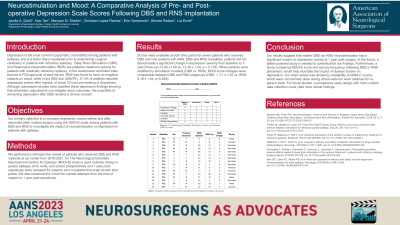Neurostimulation and Mood: A Comparative Analysis of Pre- and Post-operative Depression Scale Scores Following DBS and RNS implantation.
Neurostimulation and Mood: A Comparative Analysis of Pre- and Post-operative Depression Scale Scores Following DBS and RNS Implantation
Friday, April 21, 2023


Jamila Godil (she/her/hers)
Medical Student
Oregon Health & Science University
Portland, Oregon, United States
ePoster Presenter(s)
Introduction: Depression is the most common psychiatric comorbidity among patients with epilepsy. Deep Brain Stimulation (DBS) or Responsive Neurostimulation (RNS) are palliative treatment options utilized for patients with medically refractory epilepsy. In the SANTE trial for DBS, 37% of subjects reported worsening depression symptoms. Our primary objective is to compare depression scores before and after neurostimulator implant surgery using the Neurological Disorders Depression Inventory for Epilepsy (NDDI-E) among patients with DBS and RNS to investigate the impact of neurostimulation on depression in patients with epilepsy.
Methods: We performed a retrospective review of patients implanted with either DBS or RNS at our institution from 2019-2021. NDDI-E depression scales were available for 7 patients who received DBS and 11 patients who received RNS. We compared scores prior to surgery and one year following DBS and RNS placement. We screened for suicide attempts in patient cohort.
Results: Overall, across both DBS and RNS modalities, patients did not demonstrate a significant change in depression severity from baseline to 1-year follow-up (12.94 ±1.09 vs. 12.39 ± 1.04, p = 0.716). When patients were stratified by stimulation modality (DBS vs. RNS), NDDI score changes were comparable between DBS and RNS subgroups (DBS: -1.71 ± 1.25 vs. RNS: 0.18 ± 1.04, p=0.264). Furthermore, there were no discrepancies in the likelihood of NDDI-E score increase or decrease at follow-up between DBS and RNS patients (p=0.642). There was one suicide attempt in the DBS group with unclear etiology.
Conclusion : Our results suggest that neither DBS nor RNS neurostimulation has a significant impact on depression scores at 1 year post surgery. In the future, a better-powered study is needed to contextualize our findings. Furthermore, a study comparing NDDI-E score and seizure frequency, following DBS or RNS placement, would help elucidate the impact of disease burden on depression.
Methods: We performed a retrospective review of patients implanted with either DBS or RNS at our institution from 2019-2021. NDDI-E depression scales were available for 7 patients who received DBS and 11 patients who received RNS. We compared scores prior to surgery and one year following DBS and RNS placement. We screened for suicide attempts in patient cohort.
Results: Overall, across both DBS and RNS modalities, patients did not demonstrate a significant change in depression severity from baseline to 1-year follow-up (12.94 ±1.09 vs. 12.39 ± 1.04, p = 0.716). When patients were stratified by stimulation modality (DBS vs. RNS), NDDI score changes were comparable between DBS and RNS subgroups (DBS: -1.71 ± 1.25 vs. RNS: 0.18 ± 1.04, p=0.264). Furthermore, there were no discrepancies in the likelihood of NDDI-E score increase or decrease at follow-up between DBS and RNS patients (p=0.642). There was one suicide attempt in the DBS group with unclear etiology.
Conclusion : Our results suggest that neither DBS nor RNS neurostimulation has a significant impact on depression scores at 1 year post surgery. In the future, a better-powered study is needed to contextualize our findings. Furthermore, a study comparing NDDI-E score and seizure frequency, following DBS or RNS placement, would help elucidate the impact of disease burden on depression.
